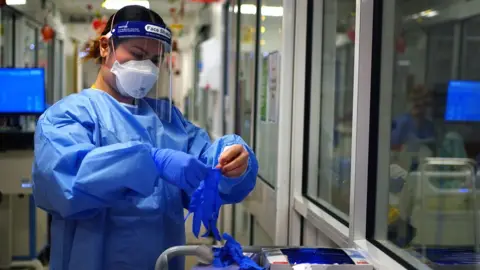Covid: Government's PPE 'VIP lane' unlawful, court rules
 PA Media
PA MediaThe government's use of a "VIP lane" to award contracts for personal protective equipment (PPE) to two companies was unlawful, the High Court has ruled.
Campaigners claimed the VIP lane was reserved for referrals from MPs, ministers and senior officials and gave some companies an unfair advantage.
A judge ruled it was unlawful to give the two companies preferential treatment as part of the VIP lane.
But she said both offers were likely to have been given contracts anyway.
The legal action was brought by the Good Law Project and EveryDoctor which claimed the Department of Health and Social Care (DHSC) unlawfully awarded contracts to supply PPE - such as medical quality facemasks and gowns - during the height of the first wave of the coronavirus pandemic.
The groups took legal action over more than £340m in contracts awarded to PestFix, a firm that supplies pest control products, and a contract worth about £252m to the hedge fund Ayanda Capital.
The campaigners said the DHSC "prioritised suppliers including PestFix and Ayanda because of who they knew, not what they could deliver".
But the DHSC told the court it "wholeheartedly" rejected the case against it and said the VIP lane was rational and resulted in a "large number of credible offers" in an environment where PPE deals often failed within "minutes".
Mrs Justice O'Farrell ruled that while the use of the VIP lane - officially known as the high priority lane - was unlawful, she found that both of the companies' offers "justified priority treatment" on their merits and were "very likely" to have been awarded contracts even without it.
The judge said the DHSC's evidence "establishes that presence on the high priority lane did not confer any advantage at the decision-making stage of the process", but she said it was clear that "offers that were introduced through the senior referrers received earlier consideration at the outset of the process".
She said the high priority lane team was better resourced and able to respond more quickly to offers but she also found "sufficient financial due diligence" was carried out in respect of both sets of contracts.
A DHSC spokesperson said at the height of the pandemic there had been a "desperate need for PPE to protect health and social care staff" and said the government "rightly took swift and decisive action to secure it".
"The ruling says it is highly likely these offers would have been awarded if they were processed through other channels also used to process offers. All contracts underwent sufficient financial and technical due diligence and the court found that we did not rely on the referral to the high priority lane when awarding contracts," they said.
A spokesman for Matt Hancock, who was health secretary at the time the contracts were awarded, said he was delighted that the court found that the priority treatment was "justified".
He said: "As the National Audit Office has confirmed, ministers had no involvement in procurement decisions or contract management.
"The department was doing the best it possibly could within the rules to respond to an unprecedented situation, and crucially, the court has rightly found that action was justified and absolutely no rectification or further action is necessary."
A court previously ruled that Mr Hancock had acted unlawfully when his department did not reveal details of contracts it had signed during the Covid pandemic.
A PestFix spokesman said the company was pleased to have been "completely vindicated" by the High Court over how the contract was awarded, saying the decision was "based purely on our ability to deliver".
He added the company had only been made aware that it had been placed in the high priority lane by a National Audit Office report in November 2020.
A spokesman for Ayanda Capital said: "We are pleased that, despite all the claims to the contrary, the court has rejected any suggestion that we were not an appropriate business to source desperately-needed personal protective equipment and concluded that the offer we made the Department of Health justified priority treatment on its merits."
The company was "doing the best we possibly could to help to respond to an unprecedented national emergency", he said, adding that the court had not criticised the way it had conducted itself in anyway.
Labour's deputy leader Angela Rayner called for an independent investigation to "get to the bottom of how £3.5bn of taxpayers' cash were handed out in crony contracts and ensure it can never happen again".
Liberal Democrat health spokesperson Daisy Cooper described the ruling as a "damning judgement" and said: "Not only did the Conservatives give their mates privileged access to lucrative Covid contracts, they did it unlawfully."
What was the high priority lane?
The high priority lane, or VIP lane, was introduced on 2 April 2020 in order to help the government choose between the offers it was getting in huge numbers.
The idea was to treat offers of PPE with greater urgency if they came from a supplier recommended by ministers, government officials or MPs and members of the House of Lords, from any party.
A National Audit Office report found that up to the end of July 2020, about one in 10 suppliers who had been put in the high priority lane was then awarded contracts, while the figure was less than one in 100 for other suppliers.
Between the start of the pandemic and 30 May 2021, the DHSC distributed more than 11.7 billion items of PPE.
But there have been issues with some items of equipment bought by the government, including masks and gowns that have had to be withdrawn from use in the NHS.
